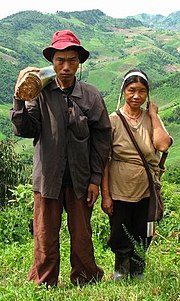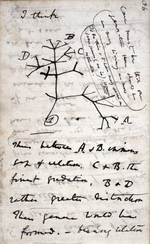Look up specie or in specie in Wiktionary, the free dictionary. Specie may refer to: Coins or other metal money in mass circulation Bullion coins Hard...
375 bytes (80 words) - 03:35, 7 April 2019
Speciation is the evolutionary process by which populations evolve to become distinct species. The biologist Orator F. Cook coined the term in 1906 for...
77 KB (8,212 words) - 21:47, 15 December 2024
Ecological speciation is a form of speciation arising from reproductive isolation that occurs due to an ecological factor that reduces or eliminates gene...
73 KB (8,156 words) - 09:51, 31 July 2024
Allopatric speciation (from Ancient Greek ἄλλος (állos) 'other' and πατρίς (patrís) 'fatherland') – also referred to as geographic speciation, vicariant...
95 KB (10,153 words) - 20:43, 15 December 2024
The Specie Circular is a United States presidential executive order issued by President Andrew Jackson in 1836 pursuant to the Coinage Act of 1834. It...
6 KB (802 words) - 18:03, 18 July 2024
In evolutionary biology, sympatric speciation is the evolution of a new species from a surviving ancestral species while both continue to inhabit the same...
34 KB (4,172 words) - 02:41, 16 December 2024
In parapatric speciation, two subpopulations of a species evolve reproductive isolation from one another while continuing to exchange genes. This mode...
28 KB (3,294 words) - 04:55, 16 December 2024
The scientific study of speciation — how species evolve to become new species — began around the time of Charles Darwin in the middle of the 19th century...
45 KB (5,410 words) - 14:17, 18 December 2024
Hybrid speciation is a form of speciation where hybridization between two different species leads to a new species, reproductively isolated from the parent...
25 KB (2,988 words) - 03:00, 13 September 2024
Reinforcement is a process of speciation where natural selection increases the reproductive isolation (further divided to pre-zygotic isolation and post-zygotic...
46 KB (5,117 words) - 06:31, 19 February 2024
Speciation of ions refers to the changing concentration of varying forms of an ion as the pH of the solution changes. The pH of a solution of a monoprotic...
4 KB (443 words) - 14:07, 12 July 2021
Allochronic speciation (also known as allochronic isolation, or temporal isolation) is a form of speciation (specifically ecological speciation) arising...
71 KB (6,647 words) - 17:09, 14 July 2024
Sub specie aeternitatis (Latin for "under the aspect of eternity") is, from Baruch Spinoza onwards, an honorific expression denoting what is considered...
16 KB (2,260 words) - 10:18, 3 December 2024
Peripatric speciation is a mode of speciation in which a new species is formed from an isolated peripheral population.: 105 Since peripatric speciation resembles...
52 KB (6,078 words) - 04:05, 5 January 2025
Human (redirect from Human specie)
Humans (Homo sapiens, meaning 'thinking man' or 'wise man') or modern humans (sometimes Homo sapiens sapiens) are the most common and widespread species...
264 KB (25,381 words) - 03:59, 9 January 2025
ProSpecieRara, the "Schweizerische Stiftung für die kulturhistorische und genetische Vielfalt von Pflanzen und Tieren" ("Swiss foundation for the cultural...
4 KB (243 words) - 19:16, 10 March 2024
Species (redirect from Species and speciation)
speciation. Charles Darwin was the first to describe the role of natural selection in speciation in his 1859 book The Origin of Species. Speciation depends...
104 KB (10,511 words) - 20:12, 5 January 2025
When speciation is not driven by (or strongly correlated with) divergent natural selection, it can be said to be nonecological, so as to distinguish it...
6 KB (597 words) - 02:36, 16 December 2024
The Yokohama Specie Bank (横浜正金銀行, Yokohama Shōkin Ginkō) was a Japanese bank founded in Yokohama in 1880, which dominated the Japanese market for trade...
18 KB (2,032 words) - 20:48, 19 December 2024
Endangered species (redirect from Endangered specie)
An endangered species is a species that is very likely to become extinct in the near future, either worldwide or in a particular political jurisdiction...
49 KB (5,023 words) - 14:27, 29 December 2024
In biology, parallel speciation is a type of speciation where there is repeated evolution of reproductively isolating traits via the same mechanisms occurring...
25 KB (2,666 words) - 13:09, 23 August 2024
Mutation Natural selection Adaptation Polymorphism Genetic drift Gene flow Speciation Adaptive radiation Co-operation Coevolution Coextinction Contingency Divergence...
69 KB (6,808 words) - 14:44, 9 December 2024
Evolution (section Speciation)
biodiversity have been shaped by repeated formations of new species (speciation), changes within species (anagenesis), and loss of species (extinction)...
241 KB (25,087 words) - 00:47, 5 January 2025
The Yokohama Specie Bank Building is a seven-story building in The Bund, Shanghai, China; previously it was a branch of Yokohama Specie Bank. It is now...
2 KB (189 words) - 21:42, 10 August 2024
Laboratory experiments of speciation have been conducted for all four modes of speciation: allopatric, peripatric, parapatric, and sympatric; and various...
39 KB (3,802 words) - 20:12, 16 September 2024
The Specie Payment Resumption Act of January 14, 1875 was a law in the United States that restored the nation to the gold standard through the redemption...
13 KB (1,715 words) - 17:00, 21 July 2024
Speciesism (redirect from Specieism)
Speciesism (/ˈspiːʃiːˌzɪzəm, -siːˌzɪz-/) is a term used in philosophy regarding the treatment of individuals of different species. The term has several...
84 KB (9,322 words) - 01:48, 1 January 2025
Chemosensory speciation (chemosensory isolation) is the evolution of a population to become distinct species that is driven by chemical stimuli (i.e.,...
12 KB (1,424 words) - 07:09, 19 February 2024
species can lead to endemism in multiple ways. Allopatric speciation, or geographic speciation, is when two populations of a species become geographically...
39 KB (4,307 words) - 04:20, 16 December 2024
Virus classification (redirect from Viral specie)
Virus classification is the process of naming viruses and placing them into a taxonomic system similar to the classification systems used for cellular...
34 KB (3,380 words) - 10:45, 1 October 2024


















